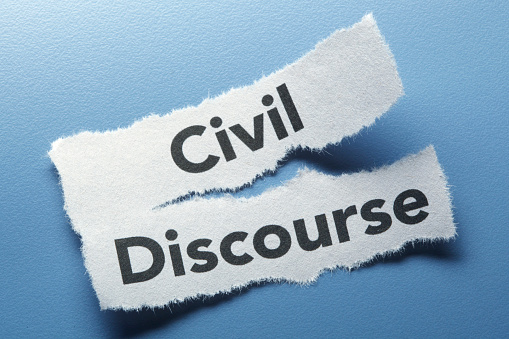Since January, we have produced six episodes introducing the CUEcast Communique series. We followed up the introductory chapters with five ensuing episodes interviewing Taylor Davis, Lynne Gackle, Jo Scurlock Dillard, Tim Sharp, and Abdue Knox … all speaking directly to the importance of effective communication as a part of strong leadership.
Today, I would like for us to pause, take a breath, and candidly discuss the world in which we live. Please join me in thinking about the current challenges we face as we communicate with each other and as we attempt to provide leadership in our various arenas of responsibility.
We all know that these are challenging, and in some ways, cruel times. The integrity and intentions of leaders are often questioned, few opinions go unexpressed no matter how hurtful or toxic, and civil discourse has too often become instead uncivil and very coarse. People’s feelings seem more brittle than ever before, and it sometimes takes very little to provoke a full diatribe of political or religious rhetoric. Sometimes, it’s difficult to tell the difference.
I dare say most of us are mentally weary, emotionally spent down, and spiritually seeking meaning in all that is happening in 2022. On some level, all of us have been traumatized to some degree or another. For some, the past two years have been the most terrifying and destabilizing time in their lives … particularly for the young, but not only for the young. Full-gown adults have been known during this time to act out of the unresolved adolescent insecurities, pain, and suffering. Meanness is a direct result of anger, and anger the direct result of fear.
When visiting the Corrymeela Peace Community near Ballycastle, Northern Ireland a few years ago, it was explained to our group that anger was put inside human beings for basic survival. In prehistoric times, when a human being was attacked, it was the fear and anger rising up inside that gave him the strength and power to charge the foe, enter the fray, and come out victorious. Anger and fear have helped us survive life and death situations when we needed to come out the winner in order just to survive. The only other option was to lose the fight … and to die. We are all here today because we are survivors, and we are all part of long ancestral lines of surviving across the centuries and millennia.
Unfortunately, we citizens of 2022 still have not completely out-gown our caveman selves. We still carry around inside of ourselves this propensity … this habit, this addition … to becoming easily frightened and frightfully angry. We can become livid at the drop of a hat. When faced with something that appears scary and threatening, we suddenly shift into full-throttle fear and anger mode, pulling our proverbial weapons … or literal weapons … making huge amounts of vocal racket, lashing out without regard for the other human beings who surround us, live beside us, or, sometimes even more tragically, share the same family of origin.
In his book THE WOUNDED HEALER: Ministry in Contemporary Society, author Henri Nouwen makes the assertion that we are all wounded, and we are all “wounders” wa well. Who among us can say that we’ve never hurt someone else? We are all guilty as charged. But the beauty expressed by Nouwen is that we all have the potential of becoming healers in the world, as well. We do not have to wallow endlessly in our wounded-ness. We do not need to remain Neanderthal in our reactions toward others who hold differing opinions and commitments that ours. In our compassionate responses to the people, our neighbors, and circumstances around us, we can reflect the radical love of Jesus. With the grace of God throbbing in our hearts and minds, we can become grace-filled peacemakers amidst the chaos we all experience today.
Adam Steele has a website called steeleyourfitness.com. Adam has said, “Trauma Comes back as reactions, not memories.” He goes on to say that we have all experienced trauma. Things have happened, words have been said, and needs have not been met. Even though we may or may not remember what has traumatized us and they may not have even seemed significant at the time. However, as time goes on, these experiences define the filters by which we view life. I believe Adam Steele is spot on in this assessment.
Not only have we all been traumatized, but I dare say we have all been traumatized over the past two years. In one way or another … or in several ways … the pandemic has pulled the curtain back on all manner of fear, insecurities, anger, intolerance, prejudice, and even hatefulness that have tinted, colored, nuanced, and filter our lives for years and even decades.
What we’re seeing in our 2022 world is our neighbors, friends, and family members expressing our pain in a plethora of ways. Sometimes we scream those fears, sometimes we whisper them, and sometimes we just push them further down inside ourselves.
Fred Rogers said, “Anything that’s human is mentionable, and anything that is mentionable can be more manageable. When we can talk about our feelings, they become less overwhelming, less upsetting, and less scary. The people we trust with that important talk can help us know we are not alone.”
And for our purposes here, let us add that when we talk about our feelings … when we mention, talk, and deal with the pain we’re feeling, we will then be able to work through them instead of react in some sideways fashion to an issue which makes us afraid or angry. We need more open discussions, more honest communication, and fewer explosive reactions, less toxic, hurtful lashing out.
If we are going to be healers in a world of woundedness, we will have to face our own internal fears, our deep-seated anger, and our long-help biases and prejudices. As we understand … really understand … more about ourselves, we will also see that there is not nearly as much difference between us and our neighbors as we had thought. When we apply the grace of Christ to both ourselves and others, we have then begun the process of becoming true peacemakers and healers.
As we communicate with one another … through written word, through the sound of our voices, through the nonverbal symbols that comprise 85% of our communication, and through the music we teach, direct, and produce, may we all be agents of hope, peace, joy, and love.
Randy Edwards
Trauma Comes Back As Reactions Not Memories (steeleyourfitness.com)







